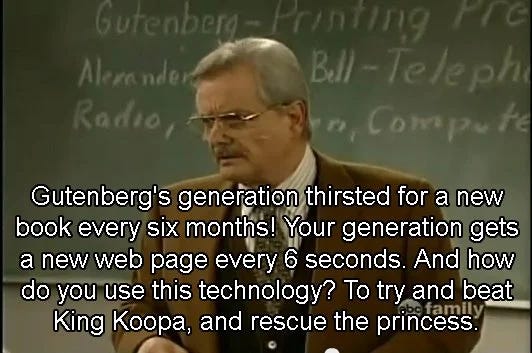Welcome to the Quarantine Creatives newsletter, a companion to my podcast of the same name, which explores creativity, art, and big ideas as we continue to live through this pandemic.
If you like what you’re reading, you can subscribe for free to have this newsletter delivered to your inbox on Wednesdays and Sundays:
Modern Writers

I’ve been giving some thought lately to the importance of good writing.
We may think of writing in the context of journalists writing a story or authors penning a book. These types of writing can cause us to think, move us to action, or escape our reality and travel somewhere new.
But I’m not only talking about professional writing. Good writing also matters in the mundane writing that we do every day and probably don’t even give much thought to. We write short text messages, we write Tweets, we write emails. People talk about Zoom fatigue over the last two years, but what about writing fatigue?
I have been producing an ad campaign for a few months. We are nearing the finish line, which means I exchange multiple emails a day with the producer who manages the post production facility where we’re editing.
Our communication has been almost exclusively by email. I was aware of how good her writing was the other day after reading a message that had many requests in it, but was also concise, well organized, and left me with meaningful action items. It was the most mundane of communications, yet it was smartly crafted and easy to understand. I hope that I am also communicating clearly when I respond to her.
I realized most of my job now involves writing like this. Since I am still working remotely, the majority of my professional communication comes through email or messages. I rarely make phone calls anymore and Zooms are often when a larger team needs to be involved, but my hourly communication with colleagues is almost exclusively written.
Were it not for writing, I wouldn’t have my current job, which is technically producing, but can sometimes seem like it’s just writing. Like most job applicants, to even be considered for the role, I submitted a written resume and cover letter to a website. I was then emailed by a recruiter, who had likely only reviewed my application after a computer scanned it and matched my experience to the position.
This is not a phenomenon only in the entrainment industry or in white collar jobs. I can remember having to write out job applications for nearly every job I’ve ever held, including minimum wage retail jobs more than 20 years ago.
Conducting business of any kind these days often requires fluency with writing English.
I recently chatted online with Amazon customer service about an item that arrived damaged and needed to be replaced. A few years ago, this would have warranted a call to a call center and perhaps a long hold time before speaking with a representative. But when the operator joined the line, I would have known that there was another human on the other end of the call, listening and hopefully addressing my needs with some empathy from hearing the sound of my voice.
Amazon encourages live chat for customer service (they also have a phone number available). I opted for the text exchange, although it didn’t even seem to be with a real human but with an AI algorithm. At first, I was prompted with a series of multiple choice answers before being asked to type in some free form responses.
The whole interaction took mere minutes and was painless. It was also a little unnerving to not be fully sure if I was writing to a human or a machine.
How differently would that Amazon text exchange have gone if I couldn’t write clearly or if it was hard to understand what I was typing? Could I still conduct a simple transaction without written skills?
I saw a Tweet last week from Arizona Senate candidate Blake Masters which echoed a similar point about ordering food at McDonald’s:


This tweet ended up on my timeline either mocking the amount of food he was ordering, his lack of understanding of how a kiosk works, or his politics. I have very little in common with Mr. Masters myself, and I think this tweet was largely meant as political posturing.
However this tweet did have me thinking about the challenges of a simple act like ordering fast food for somebody without reading skills.. I assume that in most places with automated kiosks, there is also an employee available to assist those who need help. Still, the human touch is largely missing from many food service and retail locations that emphasize self-serve options over staffing with people.
Writing is New
It may seem like we’ve always been a society that reads and writes, but it’s a relatively new phenomenon.
Humans first emerged about 2 million years ago on this planet, but writing is believed to have been invented in Mesopotamia a little over 5,000 years ago. In other words, humans have been writing for less than 1% of our existence as a species.
While the concept of writing may have existed for a few thousand years, it was not always accessible. The aristocratic ruling classes (including clergy) were the most educated, while the poor were often not able to read at all. When Johannes Gutenberg invented the printing press almost 600 years ago, about 30% of Europeans could read. Gutenberg’s invention increased access to all manner of publishing and allowed for faster dissemination of ideas (I know that from watching Boy Meets World growing up).
We often hear about the technology divide in this country, where folks without reliable internet access are excluded from parts of daily life. But there’s also a divide between those with high literacy and written skills and those who may be at a lower level or have none of those skills at all.
There aren’t many people that are fully illiterate in this country. 150 years ago, the illiteracy rate was about 20%, but today it’s less than one percent. But being illiterate is not the same as having low literacy.
According to the National Center for Educational Statistics, the U.S. adult population at or below the lowest levels of literacy is around 19%. Imagine the challenges of participation in daily life, whether that’s ordering food from a kiosk, chatting with customer service, or having to compose an email.
Instant Messages
Computers make the act of writing much easier, although in my childhood, a computer was thought of only as a word processor. You could type your thoughts and print them out as a document. Functionally, there was very little difference between a computer and a typewriter, except for the ease of erasing a typo. It took the internet to allow our thoughts to get out beyond the reach of a printed page.
Likewise, my first cell phone had the same functions as my home phone; I could make and receive calls and that was about it.
When I first gained the ability to text, it was expensive and cumbersome. Texting on early cellphones was only possible using the letters on the numerical 10-key keyboard, so it could take a long time to write a message. I believe I used to be charged 10¢ per message to text, which doesn’t seem like much, but it can add up quickly. It wasn’t until I was in college that texting was an option, and because of the limitations of the technology, it was usually reserved for emergencies or trading messages with close contacts.
These days, texting is unlimited and most people prefer to text rather than call. We text with our friends and family, we text in groups, we are texted appointment reminders from our doctor, we even text with brands for coupons.
When we text, we follow different grammatical rules and etiquette than when we write in other contexts. Some of us prefer to text in a well-thought out paragraph before hitting send, while others write in short bursts in succession as ideas come to us. Capitalization is optional, punctuation often doesn’t exist, misspellings are forgiven.
Texting is usually reserved for private conversations with close contacts, but lots of social media platforms, including Facebook, Twitter, and Reddit are also primarily based on written words. When we write on these platforms, we can share publicly for anyone in the world to see. Social media, blogs, and platforms like Substack (which hosts this newsletter) allow anybody to write anything, with the possibility of mass distribution when an idea goes viral.
It’s wild to think that for most of human history, writing wasn’t even an option, and now it’s a tool that we use everyday to connect with others and even just perform basic human functions. As I think about the most important skill that I can teach my kids to set them up for success, writing is now at the top of that list.
Related Reading
A New Era! Plus Raising Boys and Girls
If you’d like to catch up on past episodes of the Quarantine Creatives podcast, they can be found on Apple Podcasts, Spotify, or wherever you listen.
Please consider sharing this with a friend that you think might enjoy it, or better yet, share it on social media so you can tell hundreds of friends!
If you’ve missed past issues of this newsletter, they are available to read here.
Stay Safe!
Heath






